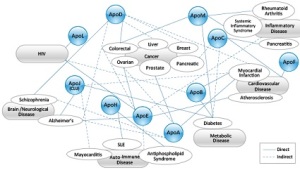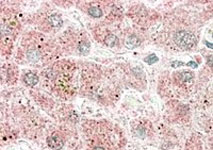
Apolipoproteins, with amphipathic properties, form lipoprotein particles with phospholipids and transport hydrophobic lipids through lymphatic and blood circulations to designated peripheral tissues or organs for energy supply, biomolecule synthesis, or degradation. Off-balance of apolipoproteins has been implicated in numerous diseases such as SLE, myocardial infarction, Alzheimer’s, and diabetes. Apolipoproteins emerge as risk markers to pinpoint different diseases.
For Cardiovascular diseases, apoF and apoB seem to have a predominant role.

apoB polymorphisms have been related to ischemic stroke, where APOB K4154K homozygosity predicts a 3- to 5-fold reduction in risk of ischemic cerebrovascular disease and ischemic stroke. This may be explained by lower plasma levels of apolipoprotein B and LDL cholesterol caused by an increased catabolism of LDL particles, although another yet-unknown mechanism is also possible.

As for apoF, it has been shown to be associated almost exclusively with LDL. It has CETP inhibitor activity. It may be involved in transport and/or esterification of cholesterol.
Other apolipoproteins important in cardiovascular disease include apoA1, apoA2, and apoC3. Recent publications have shown that there is a trend toward an inverse association between apoA2 and all-cause mortality. The lack of an association between HDL cholesterol and cardiovascular risk may support the concept of dysfunctional HDL in hemodialysis. The authors conclude, in any case, that possible beneficial effect of apoA2 on survival requires confirmation in future studies.
Working on apolipoproteins and their link to cardiovascular or other diseases? We would be interested to know!



